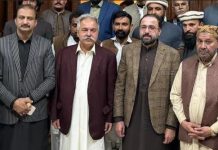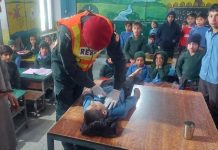ISLAMABAD, DEC 05 (APP/DNA):The fourth working session titled, ‘Transforming Regional Dynamics and Architecture: Pakistan’s Posture’ was hosted by the Center for Afghanistan Middle East and Africa (CAMEA).
The keynote speaker at the session was Hina Rabbani Khar, Pakistan’s former Foreign Minister and currently the Chairperson of the Standing Committee on Foreign Affairs of the National Assembly of Pakistan, said a press release issued here on Thursday.
Other speakers included Amina Khan, Director, CAMEA, Ambassador Asif Durrani, Pakistan’s former Special Representative on Afghanistan, Mr. Kawa Hassan, Non-resident Fellow with Stimson’s Middle East program, Haroon Sharif, former Minister and Chairman BOI, Michael Kugelman, Director of the South Asia Institute at the Wilson Center in Washington, D.C. and Mr. Leo Wigger, Associate Partner, Candid Foundation, Germany.
Amina Khan, in her welcome remarks stated that the regional strategic landscape has been fundamentally reshaped by 3 major factors: great power competition; events in neighbouring Afghanistan as well as regional connectivity in South and Central Asia. She further said that these developments have prompted Pakistan to reevaluate its diplomatic strategies and find ways to navigate its national interests while maintaining its regional influence.
In her Keynote address, Ms. Hina Rabbani Khar said that the world is transforming and people are fighting for primacy for the rule of the world. The war in Gaza and its military and diplomatic support has exposed the major powers, with Israel being let off with impunity. She further said that South Asia has suffered due to a lack of good bilateral relationships. Pakistan is centrally located in South Asia, and collectively the region has not performed well in addressing the challenges. Countries that do not learn from their mistakes are continuously suffering and history and geography are two constants that cannot be changed, she concluded.
Ambassador Asif Durrani, speaking on ‘Sustainable Peace and Security in Post-Taliban Afghanistan’ highlighted Afghanistan’s fragile stability under the Taliban rule, marked by dire economic conditions and widespread poverty. While noting governance improvements like reduced corruption and counter-narcotics efforts, he criticized the Taliban’s ban on women’s education and work, which have drawn international condemnation and deepened their isolation. He warned that this isolation enables terrorist groups like ISKP and TTP to exploit Afghan soil, posing regional and global threats. Emphasizing a regional approach, he called for Pakistan to play a pivotal role by initiating counterterrorism dialogue with the Taliban and addressing India’s destabilizing actions, such as financing terrorist groups through Afghan proxies.
Kawa Hassan, while talking about ‘Geopolitical Shifts in the Middle East,’ emphasized the transformative impact of recent events in the Middle East. He described Hamas’ actions as a strategic miscalculation, resulting in devastating consequences for Palestinians. While Israel, supported by the U.S. has weakened Hamas and Iran’s “Axis of Resistance.” He also warned that the military gains are meaningless without resolving the Palestinian statehood issue. Major challenges remain, such as Gaza’s destruction and lack of support from major powers.
Haroon Sharif, while shedding light on ‘Leveraging Economic Connectivity in West Asia’, stated that there are multiple powerful economic countries in Asia at present. Physical proximity is an economic advantage, especially after Covid. The economic geography continues to overtake the political geography. He further stated that connectivity alone does not pay dividends, unless backed by private capital and institutions.
Michael Kugelman, while speaking about ‘Non-Traditional Threats and Challenges’, opined that climate change is a very serious threat for Pakistan, who is a light contributor to climate change. He further said that climate change is a serious issue and deserves so much more attention than it gets and can be best described as the current crisis in multilateralism that is playing out in South Asia and beyond globally.
Leo Wigger, while expressing his views on ‘Enhancing Trade and Connectivity in South Asia’ was of the view that South Asia is one of the least connected sub-regions in the world. Regional connectivity initiatives offer a lot of potential for EU-German investment which is not very prominent in South Asia at present.

















